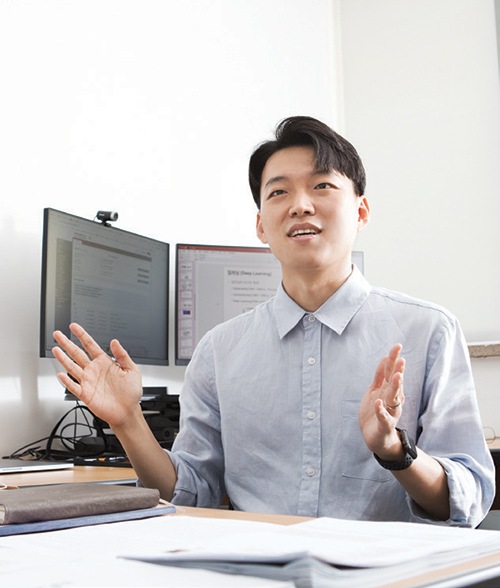
- MEET 3
- Professor Cho Min-Su from the department of information convergence within the school of software convergence
content area
The first professor who graduated from UNIST
school of business administration opens
new horizons through convergence
Professor Cho Min-Su from the Department of Information Convergence
within the School of Software Convergence at Kwangwoon University
- Story by Editorial Room Photo by Kim Beom-Ki

“I have been working on a research project on process mining, which started a while before data mining. I plan to continue the research that utilizes data in order to deduce insights in relation to the process.”
Professor Cho Min-Su entered the Department of UNIST Techno Management (currently School of Business Administration) that was the first undergraduate program and completed his course from the Department of Management Engineering within the Graduate School. In March 2021, he was appointed as a professor within the Department of Information Convergence in the School of Software Convergence at Kwangwoon University. Professor Cho became the first professor who completed the undergraduate and graduate Schools of Business Administration in UNIST last September. How did professor Cho shift the focus of his career to the School of Natural Science and Engineering from the School of Business Administration?
“When I was a junior in the undergraduate school, participated in a research project to predict the price related to crude oil based on data together with Professor Chung Moo-Young who was the third president and vice president of UNIST. I worked on the research for about two years, and at this time I developed interest in data-based research and entered the Department of Management Engineering in March after graduation from UNIST in February 2013.”
In 2009, professor Cho entered the Department of Techno Management at UNIST, but later he changed his career direction and joined the Department of Management Engineering. Even though he could select either management or management engineering for the graduate school, he shifted focus to management & engineering as he was interested in discovering new insights hidden in the data through various analytic algorithms. The present major known as industrial engineering was the former management engineering that professor Cho had chosen. It was the starting point of his quest for the field that would match better with his research interests. However, there was another reason that affected his career selection. His guide professor Song Min-Seok had also influenced him when he was in the Graduate School of Management Engineering. Professor Song was a graduate from the department of industrial engineering although he was an affiliated professor for the Department of Management Engineering. Professor Cho learnt from the career pursued by Professor Song that it was sufficient to carry out the research on Management Information Systems (MIS) even if he graduated from the department of industrial engineering. He was able to find the field of his interest after reading up widely about the kind of synergy natural sciences and engineering could create in convergence with business administration and the direction in which he could move forward further.
“My major in the Undergraduate School of Business Administration was finance and banking. While I participated in the research, I was more interested in the field of MIS among the courses offered by the Department of Business Administration. Most of all, I focused on the research on data science, which is connected to industrial engineering. Thus, I studied other subjects in my undergraduate school but I decided to change my major to MIS or industrial engineering.” At that time, the educational direction of UNIST also played a role in his selection. The key word of education at the time was convergence. It created a momentum for him to pursue two different majors and approaches actively through the encouragement UNIST extended to students of Natural Science and Engineering to study one track of business administration and to students of business administration to study one track of Natural Sciences and Engineering. As a result, professor Cho was able to maximize the utilization of each field regarding different methods to approach the data research by the Department of Business Administration and the Department of Industrial Engineering to experience both fields. Professor Cho graduated from UNIST in 2018. He worked as a researcher for about 1 year after he had completed the PhD program at the Pohang University of Science and Technology and worked for about one and half years at the governmental research institute of KITECH (Korea Institute of Industrial Technology). He was appointed as a professor by Kwangwoon University in March, 2021 when he started lecturing. Early this year, professor Cho began teaching courses of AI Mathematics and Text Mining. At present, he teaches discrete Mathematics and data analytics.
“In the case of AI that attracts much attention now, the algorithms are all based on Mathematics. It is difficult to understand AI without the mathematical basics of differential equations, Linear Algebra, and optimization. Algorithms are easier to utilize once you acquire some knowledge of the underlying principles. This tells us why it is important to develop an understanding of AI mathematics.”
Professor Cho’s current major research field is process mining on which he has worked since his Master’s and PhD programs. Information systems that fit the characteristics of each organization are utilized in various fields of our society. Applications like Enterprise Resource Planning (ERP), Hospital Information System (HIS) and Manufacturing Execution System (MES) are some examples.
Professor Cho focuses on research to deduce insights in relation to the process based on the data of event log type accumulated and extracted through the information system. Especially, along with his PhD thesis, “A Data Analysis Methodology for Process Diagnosis and Redesign in Healthcare”, he continues to study process mining under the healthcare environment. He said he would serve as a guide to his junior students as a newly appointed professor, the first graduate of UNIST and the first professor in the Department of Business Administration. “As I was the first graduate, I did not have seniors. I respected all members in the lab of the advising professor and sought their advice. However, apart from me some of my seniors from my alma mater have become professors. I can now tell how I was appointed as a professor and describe the process that I went through.”
As COVID-19 had forced the departments to pursue untact classes, professor Cho confessed that his teaching job did not seem real. Professor Cho is hoping that this pandemic crisis passes quickly so that he could give lectures to students dynamically.


